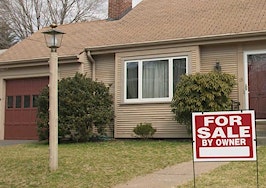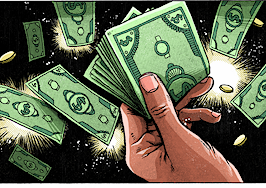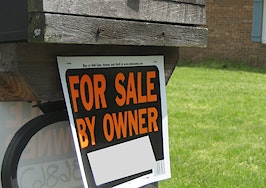Most homeowners would probably prefer to have a professional licensed Realtor work on their behalf to sell their home, but not everyone sees the value of paying a fee for an agent’s expertise. I get it — it is not easy to recognize all the work it takes to prepare a home for sale, list it, market it and make sure everyone involved in a transaction is on schedule and committed all the way through closing.
Selling a home is hard work!
Great agents make great partners because we bear the (substantial) cost of marketing, we have the ability to expose people’s homes to more buyers, deal with the mounds of paperwork and save the homeowner time, stress and money.
Still, people sell their homes as a For sale by owner (FSBO) every day, sometimes with great success. According to the National Association of Realtors, 7 percent of home sales in the United States are FSBOs. Many of these sales are not publicly marketed — they are the type where the buyer and seller have a previous relationship, like buying a childhood home from a parent, a friend buying another friend’s home or even selling to a builder or investor.
Selling a home without professional representation is an arduous undertaking — a FSBO home sale adds a much greater level of complexity and a few extra emotional hurdles for the homeowner and potential buyers. Here are 10 common difficulties FSBOs — and buyers — tend to face:
10 common difficulties that come with FSBOs
1. The ‘on sale’ vs. ‘for sale’ mentality
Buyers may look at FSBO homes as “on sale” instead of “for sale.” Homes with unrepresented sellers sell for nearly 33 percent less and take significantly longer to sell than homes sold through the Realtor network.
Plus, let’s be honest, a yard sign from a well regarded brokerage company looks a lot more professional than a “For Sale By Owner” poster from a hardware store taped to the mailbox.
2. Buyers get uncomfortable dealing directly with sellers
Some buyers don’t prefer to tour a home with the owner of the property. Often, they might not feel that they can speak freely and could be uncomfortable having the homeowner follow them around. This could make them less likely to make an offer to purchase the home.
3. Emotional attachment to the home
Homeowners are emotionally attached to the home, which inhibits their ability to negotiate and depersonalize the space. This is the reason that professional agents don’t sell their own homes.
4. Overspending during prep
Homeowners might not know what is necessary to fix or update in their home, so they might overspend when preparing their home for sale. A good Realtor should be able to provide an owner with an outline of which features are important to homebuyers and help them prioritize a punch list to prevent them from wasting money.
Showing a home to unqualified buyers or con artists is a dangerous waste of time and energy. Unrepresented sellers don’t have systems in place to vet qualified buyers. They will be inundated with calls from real estate agents who’d like to list and sell their home, “just-looking” types who don’t intend to buy, investors looking for a flip, earnest buyers who are looking at homes they can’t afford to buy and even criminals.
Most professional Realtors will only work with qualified, motivated buyers.
5. Issues with commission
The vast majority of homes for sale find their buyers through other real estate agents who are helping them shop for a home, not through the homeowner’s listing agent (or a yard sign for that matter).
Realtors work with buyers for free with the understanding that when they purchase a home the agent will receive a commission on the sale. It takes a lot of work and time touring homes and seeing a purchase of a home through to closing, so it is fair to expect compensation for your professional services.
Homeowners who sell their own homes without a Realtor usually do so to save on commission — they either offer no commission to a buyer’s agent, or a commission that is lower than the industry standard for their area.
Although Realtors have a fiduciary responsibility to their clients to find them the best home regardless of compensation, some may steer their clients toward homes that promise a competitive fee.
6. No access to the multiple listing service (MLS)
While it is true that many people start their home search on a public website, like Zillow, most agents never look at those sites — they search for homes through the MLS database. In other words, Realtors primarily market a home for sale to other Realtors.
Buyers will most likely come from another agent, so if a homeowner isn’t advertising their home where buyer’s agents are searching, they aren’t reaching buyers.
7. Pricing
Pricing is a crucial component to selling a home. As Realtors, we will look at comparable home sales and neighborhood statistics, use a deep knowledge of every home available for sale in the area and a fundamental understanding of the current housing market to arrive at a value for a home.
The public websites are unreliable, so an unrepresented seller might not have the right information and almost certainly doesn’t know the local real estate market nearly as well as a pro, which can lead them to price their home incorrectly. Too high then the home sits on the market and gets stale, too low then they might fail to to see a good return as buyers are much less likely to make an offer above the asking price on a FSBO than they are on a home listed with a Realtor.
They often want an unrepresented seller’s “savings” on broker fees to be passed on to them, so they are more likely to offer a lower price. It’s a lose-lose.
8. Marketing
In addition to placement on the MLS, there are many different ways a Realtor will advertise your property, and all of them cost money and take time to create. Realtors rely on efficient systems based on data and experience that they have put in place over time. From professional photography, personal websites and videos to targeted digital and print marketing, the expertise necessary to be successful is great and the costs add up — but good agents absorb those costs because they believe in the value they have placed on the home.
9. De-personalizing the home
De-personalizing a home for sale is imperative. Having a real estate agent partner with a seller to comb through the home and start packing up photos and unique items is a huge value-added service. They are moving anyway — might as well start packing!
Most great real estate agents will pay for a consultation with a professional home stager to further declutter and prepare a seller’s home for sale. I am a Realtor and a professionally certified home stager. I will consult with my clients from day one and provide a free staging plan for them to execute, and when they move into their next home I will be there to help with design.
It is hard for unrepresented buyers to depersonalize their own homes, but for real estate agents, it is about maximizing the home’s appeal and raising its value for more prospective buyers.
10. Paperwork and legalities
The amount of paperwork and organization it takes to guide a home sale transaction from offer through closing is immense. Most unrepresented sellers are not familiar with the process or terminology, nor are they truly aware of all the potential pitfalls and legal protections necessary in a real estate transaction.
A quick conversation about paperwork can make a homeowner feel overwhelmed and ill-prepared, and they might be inclined to pass off that stress to the confident trained professional standing in front of them.
Helping FSBOs
When I speak with homeowners who are thinking of “going FSBO,” I try to be encouraging by telling them it’s not impossible to have a great experience selling their home without representation, but that having realistic expectations is important. If they have the time, money and energy to manage the sale of what is likely their biggest investment, then I would suggest real estate agents offer free advice about the process.
What you can do
I firmly believe that helping and giving before asking for anything in return is the surest way to gain trust, and potential FSBO clients are nothing if not skeptical. Speak broadly about what lies ahead for them and they will soon see the full scope of work they are thinking of undertaking.
I like to use technical terms that non-real estate professionals might not be familiar with. (Hey, if they want to play my role they should understand there is a steep learning curve.) Here are a few tips for real estate agents interested in assisting FBSOs:
- Tell them to start by tidying up and to refresh some areas that might have become dated or weathered.
- They should make necessary repairs and updates, but only with things that have been proven to have a positive return on investment.
- Guide them through all of this and provide them with a proven outline.
- Ask the homeowners about their digital marketing strategy (beyond posting on Zillow). Explain that it is not easy for non-professionals to run targeted, paid advertisements on search engines and social media. They should be made aware that real estate agents have sophisticated marketing strategies that they execute — and pay for — on behalf of their clients.
- Ask them if they are planning on cooperating with brokers by offering full commission to the buyer’s agent. This is a great way to educate them on who generally brings buyers to the home sale — and let them know that agents might be less inclined to bring buyers if they will not be compensated appropriately.
When the FSBO sticks with their FSBO plan
If after having this conversation the homeowner is still not convinced to list their home with you, it doesn’t mean you have failed. If they insist on giving it a go as a FSBO, let them know they can call you any time with questions. Help them as much as you can by doing the following:
- Give them great advice about how to organize, advertise and host an open house.
- Tell them about any free software they can use to capture sign-in data.
- Offer to follow up with the people who visited and gather feedback for the homeowner. (Explain that you would be more reliable since you are a neutral party.)
- Stress to the homeowner that you will not represent any of these people, so you will not need to be paid a commission if they wind up making an offer on the home.
- Ask if you could leave some flyers highlighting your expertise as a Realtor who helps buyers find the right home. (The fact is, if 20 people walk through an open house, only one person can buy it — that leaves 19 potential buyers who are still looking to buy a home, and they could all use the help of a great Realtor.)
I want to provide value to homeowners so I become top of mind when they are asked for referrals. All of this leads to a win-win!
Most of us don’t sell our own cars by ourselves, act as our own attorneys or manage our own investments — we prefer full service to no service, especially when the learning curve is steep and the stakes are high. Why would a homeowner choose the increased risk and hard work of selling their own home for a lower financial return? I’m not sure, but I will continue to encourage the ones who do in the hope that I can reap some benefit in the long run.
I make sure to tell potential sellers who are thinking of selling their home without an agent that many FSBOs find success. But leave them with this fact: Colby Sambrotto, one of the founders of ForSaleByOwner.com, isn’t one of those successful FSBOs. And after failing to sell his New York City condo as a FSBO, he ultimately sold it through a licensed professional Realtor — and it sold for 7.5 percent more than Sambrotto was asking when he was trying to sell it on his own.
Rich Peluso is a Realtor associate with Elite Homes Group – Coldwell Banker Residential Brokerage in New Jersey. Connect with him on Facebook or Instagram.







